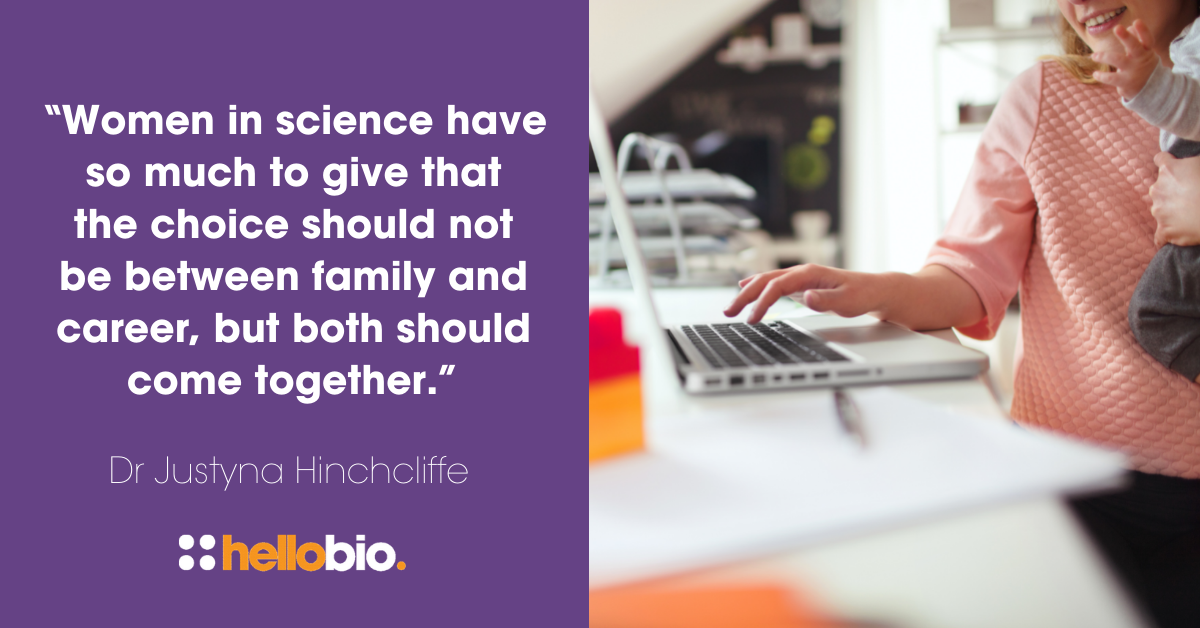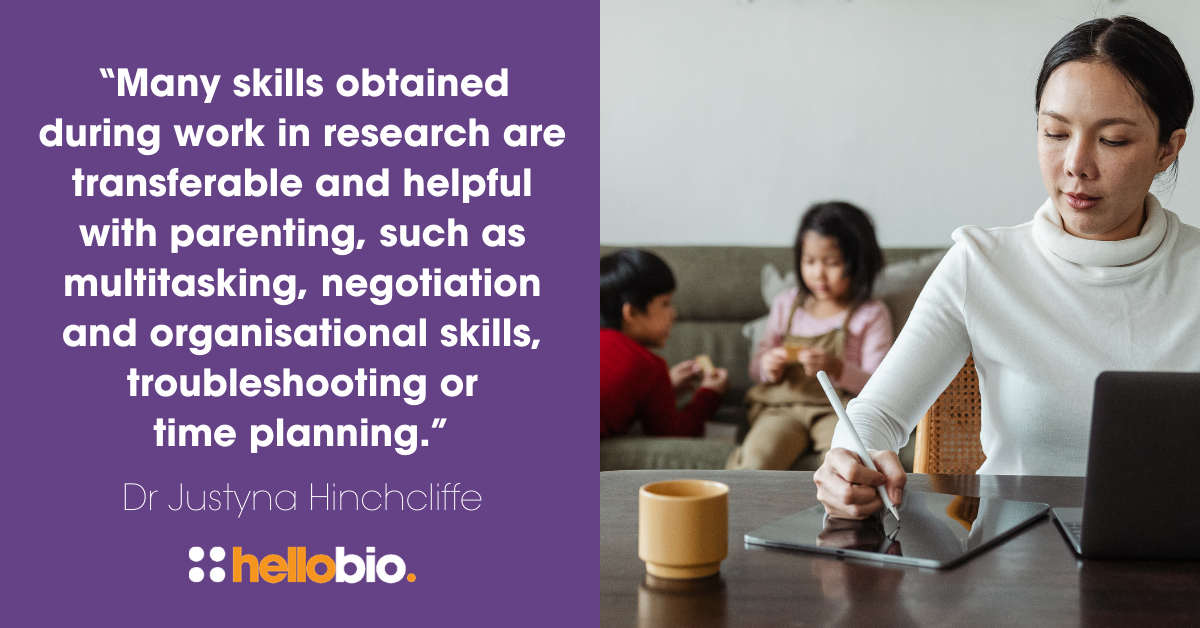Parenting and a Science Career: Perspectives of a Mother in Academia
Statistics from UNESCO Science Report show that only 14% of senior academic roles in science are held by women in Europe. Just 33.3% of scientific researchers are women worldwide. What could be the reasons behind those numbers? On top are the everyday challenges of childcare, like high nursery costs, but also mothers being perceived as less committed and less dependable employees, which represent the ‘motherhood penalty'.
“Sometimes being a parent in academia feels like riding a bike with a flat tire - you're working as hard as you can, you're exhausted and sweaty, but people are passing you with ease.” - Dr. Academic Mom (Twitter: @Momademia)
Balancing parenthood and a scientific career is not easy
Balancing scientific research careers and having a good work-life balance is a difficult task for all working mums. There is no convenient time to have children for women in science. If it happens during your PhD, we worry about finishing the experimental part on time or how we can write up our thesis with a baby in tow. Starting as a post-doctoral researcher on a new grant is also not ideal. You might not have secure maternity financial support in this period. What about the end of the postdoc role? You know that financial support continuity is not there. It is a challenging task to find a job whilst being pregnant. Jobs for post-doctoral researchers are usually short fixed-term contracts and provide minimal stability and security for mums.
Working mums in science have fewer opportunities to work part-time and juggle the demands of raising their children and to work productively. Publishing research, making further progress on their careers, and competing in future job opportunities are made more challenging by caring for young children. Mobility between research institutions is an expected step in gaining skills and experience but this is not easy once you have children.
What could help scientific mums to handle these issues? A supportive supervisor or PI is crucial and makes a massive difference in every aspect of your work. From stories that can be heard from other mother scientists, that is not always the case. Some research institutions assume mothers are a huge liability regarding their productivity, commitment and continuity of experimental work. I am lucky to have a very supportive PI, who was kind and understanding from the beginning of my motherhood journey. This positive approach to such a fantastic life event supported my mental health, financial stability, and passion for science and motivation to carry on with research work.
Unlocking funding opportunities
More and more scientific institutions and funding bodies recognise the need for more gender equality in parental leave policies, more flexible funding opportunities for PhD, post-doc or fellowship positions. One example is L'ORÉAL-UNESCO National and Regional Programs for Women in Science and International Rising Talents. These awards enable young talents to pursue their scientific career. Acknowledging the disparity between women and men in science, they focus on women.
In the UK, there is the Daphne Jackson Trust for researchers enabling a ‘retrain and return’ to research after a break of two or more years taken for family, caring or health reasons. The Trust supports flexible and part-time working patterns.
Another example in the UK is Wellcome Trust who introduced a new funding scheme for early career researchers. The Wellcome Early Career Awards are tailored for projects lasting up to 5 years. This length of time provides certainty for a scientific career path which we all know is long-term and financial security.
The Young International Brain Research Organisation Maternity/Parenthood Grant aims to support early career Principal Investigators who are approaching parental leave by providing supplemental funding.
These initiatives should make mums in science hopeful that a trend is now set. More organisations and people are recognising that women in science have so much to give that the choice should not be between family and career, but both should come together.
Impact of COVID-19 on scientist-parents
The challenges of parenting in 2020 and the early part of 2021 are well discussed—for example, the move to remote working with no childcare and the classroom of home-schooling. According to a study from the Office for National Statistics, women performed more household labour and spent more time on childcare than men (in my household too!).
What effect was there for science mums? With a change in working hours (from early morning to very late) and childcare shifts, female academics have published fewer preprints, have started fewer research projects and spent less hours on research work than their male peers during 2020.
My son followed me everywhere – I remember a meme which suggested that by supergluing a parrot to your shoulder, it imitated looking after a young child during the lockdowns. How true! He was a daily participant in many of my virtual meetings. I was grateful my lab colleagues were so understanding. Long months of coping with working with children at home left many academic parents stressed, mentally exhausted, burnt out and running on fumes of energy. Their voices could be heard on various social media platforms, especially on Twitter. Academic parents community supported each other by sharing their experiences, tips and ideas on entertaining their little ones in these unprecedented times.
Reflections and some words of advice
Some people say that having babies is the hardest part of parenthood. But few people talk about toddlerhood! This period is an intense, stressful and very testing time for mothers who need to get back on their feet with their research work. Nonetheless, many moments keep you going, like when you wait all day to pick up your toddler from the nursery to see that happy face running towards you.
Many skills obtained during work in a research environment are transferable and helpful with parenting, such as multitasking, negotiation and organisational skills, troubleshooting or time planning. These are crucial to surviving when you are back at work, whilst raising a tiny human in the meantime. Working as a scientist is hard now, but it will be twice harder once the bump becomes a baby. Apart from your normal workload, you will have a parenting load and be chronically sleep-deprived. Does it sound too pessimistic and discouraging? But you manage with the strength of your colleagues and your partner around you.
Would I do it all again? 100% yes. Would I change anything, perhaps my career path or timing when to have children? No, being a parent is the best thing in the world. It is rewarding and motivating to be a better scientist, put into perspective what is valuable in life, and change your life priorities. When you hear your 3-year-old proudly saying, “My mummy is a rat doctor” (I’m a behavioural neuroscientist) feels like more recognition than your H-index or how many publications are in your CV. You value those moments.
Never refuse help from others, family or friends. Use all support that is offered. Do not be afraid to ask for help too. Look after yourself and have some ‘Me Time’ to do something you enjoy. These moments will help you to recharge and rejuvenate.
If you would like to have children and are unsure when is the best time, start a family when YOU feel ready. There is never a good time in science, and sooner or later, things will work out for you and job opportunities will appear on the horizon. Never feel discouraged - there are so many successful scientists, mothers and fathers.
Just keep going and remember, children are only little once...
_________________________________________________
Justyna Hinchcliffe is a behavioural neuroscientist, working as a Research Associate at the University of Bristol, UK. Her research interests are in the field of behavioural psychopharmacology and animal welfare. She is a mum of 1 (second baby on the way) and in her spare time loves baking brachiosaurus biscuits with her son.Connect with Justyna:
- Twitter: @Dr_Hinch
- Researchgate: Justyna K Hinchcliffe
_________________________________________________
If you enjoyed this article, why not check out the other resources available on our blog. We are passionate about supporting life scientists, early career life scientists and PhD students - with really low- priced reagents and biochemicals, early career scientist grants, and resources to help with both personal and professional development. We know how tough it is - so we hope you find these helpful!
Advice & guidance for life scientists
Click below to view our essential guides and articles to support life scientists, PhD students & early career life scientists:
Wellbeing for scientists
Click below for our resources to help improve your wellbeing:
Technical resources
Try our Molarity Calculator: a quick and easy way to calculate the mass, volume or concentration required for making a solution.
Try our Dilution Calculator: an easy way to work out how to dilute stock solutions of known concentrations
And - when you get to the stage of planning your experiments, don't forget that we offer a range of agonists, antagonists, inhibitors, activators, antibodies and fluorescent tools at up to half the price of other suppliers - click below to see how we compare with other suppliers:




















